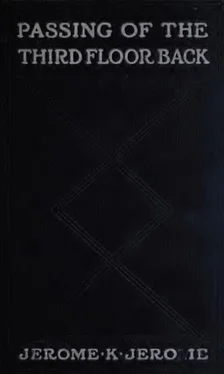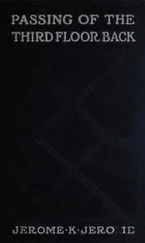Jerome K. Jerome
Passing of the Third Floor Back
The neighbourhood of Bloomsbury Square towards four o'clock of a November afternoon is not so crowded as to secure to the stranger, of appearance anything out of the common, immunity from observation. Tibb's boy, screaming at the top of his voice that she was his honey, stopped suddenly, stepped backwards on to the toes of a voluble young lady wheeling a perambulator, and remained deaf, apparently, to the somewhat personal remarks of the voluble young lady. Not until he had reached the next corner—and then more as a soliloquy than as information to the street—did Tibb's boy recover sufficient interest in his own affairs to remark that he was her bee. The voluble young lady herself, following some half-a-dozen yards behind, forgot her wrongs in contemplation of the stranger's back. There was this that was peculiar about the stranger's back: that instead of being flat it presented a decided curve. “It ain't a 'ump, and it don't look like kervitcher of the spine,” observed the voluble young lady to herself. “Blimy if I don't believe 'e's taking 'ome 'is washing up his back.”
The constable at the corner, trying to seem busy doing nothing, noticed the stranger's approach with gathering interest. “That's an odd sort of a walk of yours, young man,” thought the constable. “You take care you don't fall down and tumble over yourself.”
“Thought he was a young man,” murmured the constable, the stranger having passed him. “He had a young face right enough.”
The daylight was fading. The stranger, finding it impossible to read the name of the street upon the corner house, turned back.
“Why, 'tis a young man,” the constable told himself; “a mere boy.”
“I beg your pardon,” said the stranger; “but would you mind telling me my way to Bloomsbury Square.”
“This is Bloomsbury Square,” explained the constable; “leastways round the corner is. What number might you be wanting?”
The stranger took from the ticket pocket of his tightly buttoned overcoat a piece of paper, unfolded it and read it out: “Mrs. Pennycherry. Number Forty-eight.”
“Round to the left,” instructed him the constable; “fourth house. Been recommended there?”
“By—by a friend,” replied the stranger. “Thank you very much.”
“Ah,” muttered the constable to himself; “guess you won't be calling him that by the end of the week, young—”
“Funny,” added the constable, gazing after the retreating figure of the stranger. “Seen plenty of the other sex as looked young behind and old in front. This cove looks young in front and old behind. Guess he'll look old all round if he stops long at mother Pennycherry's: stingy old cat.”
Constables whose beat included Bloomsbury Square had their reasons for not liking Mrs. Pennycherry. Indeed it might have been difficult to discover any human being with reasons for liking that sharp-featured lady. Maybe the keeping of second-rate boarding houses in the neighbourhood of Bloomsbury does not tend to develop the virtues of generosity and amiability.
Meanwhile the stranger, proceeding upon his way, had rung the bell of Number Forty-eight. Mrs. Pennycherry, peeping from the area and catching a glimpse, above the railings, of a handsome if somewhat effeminate masculine face, hastened to readjust her widow's cap before the looking-glass while directing Mary Jane to show the stranger, should he prove a problematical boarder, into the dining-room, and to light the gas.
“And don't stop gossiping, and don't you take it upon yourself to answer questions. Say I'll be up in a minute,” were Mrs. Pennycherry's further instructions, “and mind you hide your hands as much as you can.”
***
“What are you grinning at?” demanded Mrs. Pennycherry, a couple of minutes later, of the dingy Mary Jane.
“Wasn't grinning,” explained the meek Mary Jane, “was only smiling to myself.”
“What at?”
“Dunno,” admitted Mary Jane. But still she went on smiling.
“What's he like then?” demanded Mrs. Pennycherry.
“'E ain't the usual sort,” was Mary Jane's opinion.
“Thank God for that,” ejaculated Mrs. Pennycherry piously.
“Says 'e's been recommended, by a friend.”
“By whom?”
“By a friend. 'E didn't say no name.” Mrs. Pennycherry pondered. “He's not the funny sort, is he?”
Not that sort at all. Mary Jane was sure of it.
Mrs. Pennycherry ascended the stairs still pondering. As she entered the room the stranger rose and bowed. Nothing could have been simpler than the stranger's bow, yet there came with it to Mrs. Pennycherry a rush of old sensations long forgotten. For one brief moment Mrs. Pennycherry saw herself an amiable well-bred lady, widow of a solicitor: a visitor had called to see her. It was but a momentary fancy. The next instant Reality reasserted itself. Mrs. Pennycherry, a lodging-house keeper, existing precariously upon a daily round of petty meannesses, was prepared for contest with a possible new boarder, who fortunately looked an inexperienced young gentleman.
“Someone has recommended me to you,” began Mrs. Pennycherry; “may I ask who?”
But the stranger waved the question aside as immaterial.
“You might not remember—him,” he smiled. “He thought that I should do well to pass the few months I am given—that I have to be in London, here. You can take me in?”
Mrs. Pennycherry thought that she would be able to take the stranger in.
“A room to sleep in,” explained the stranger, “—any room will do—with food and drink sufficient for a man, is all that I require.”
“For breakfast,” began Mrs. Pennycherry, “I always give—”
“What is right and proper, I am convinced,” interrupted the stranger. “Pray do not trouble to go into detail, Mrs. Pennycherry. With whatever it is I shall be content.”
Mrs. Pennycherry, puzzled, shot a quick glance at the stranger, but his face, though the gentle eyes were smiling, was frank and serious.
“At all events you will see the room,” suggested Mrs. Pennycherry, “before we discuss terms.”
“Certainly,” agreed the stranger. “I am a little tired and shall be glad to rest there.”
Mrs. Pennycherry led the way upward; on the landing of the third floor, paused a moment undecided, then opened the door of the back bedroom.
“It is very comfortable,” commented the stranger.
“For this room,” stated Mrs. Pennycherry, “together with full board, consisting of—”
“Of everything needful. It goes without saying,” again interrupted the stranger with his quiet grave smile.
“I have generally asked,” continued Mrs. Pennycherry, “four pounds a week. To you—” Mrs. Pennycherry's voice, unknown to her, took to itself the note of aggressive generosity—“seeing you have been recommended here, say three pounds ten.”
“Dear lady,” said the stranger, “that is kind of you. As you have divined, I am not a rich man. If it be not imposing upon you I accept your reduction with gratitude.”
Again Mrs. Pennycherry, familiar with the satirical method, shot a suspicious glance upon the stranger, but not a line was there, upon that smooth fair face, to which a sneer could for a moment have clung. Clearly he was as simple as he looked.
“Gas, of course, extra.”
“Of course,” agreed the Stranger.
“Coals—”
“We shall not quarrel,” for a third time the stranger interrupted. “You have been very considerate to me as it is. I feel, Mrs. Pennycherry, I can leave myself entirely in your hands.”
The stranger appeared anxious to be alone. Mrs. Pennycherry, having put a match to the stranger's fire, turned to depart. And at this point it was that Mrs. Pennycherry, the holder hitherto of an unbroken record for sanity, behaved in a manner she herself, five minutes earlier in her career, would have deemed impossible—that no living soul who had ever known her would have believed, even had Mrs. Pennycherry gone down upon her knees and sworn it to them.
Читать дальше










